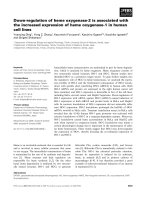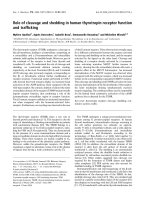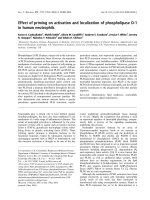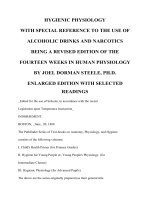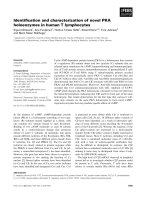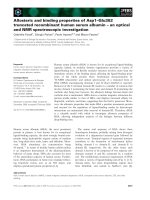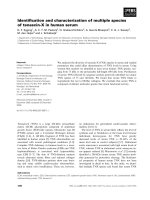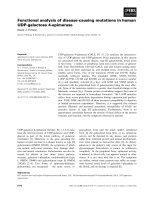IMMOBILIZATIONS OF ANTI JEV ANTIBODIES IN HUMAN SERUM FOR DIRECT IMMUNOSENSORS
Bạn đang xem bản rút gọn của tài liệu. Xem và tải ngay bản đầy đủ của tài liệu tại đây (4.59 MB, 25 trang )
IMMOBILIZATIONS OF ANTI-JEV ANTIBODIES
IN HUMAN SERUM FOR DIRECT
IMMUNOSENSORS
Tran Quang Huy
1,2
, Phan Thi Nga
1
,
Nguyen Thi Hong Hanh
1
, Mai Anh Tuan
2
1)
National Institute of Hygiene and Epidemiology (NIHE), N°1 – Yersin Str., Hanoi
2)
International Training Institute for Materials Science (ITIMS), Hanoi University of
Technology (HUT), N°1 Dai Co Viet Road, Hanoi
Email:
Da Nang - 2009
HỘI NGHỊ VẬT LÝ CHẤT RẮN VÀ KHOA HỌC VẬT LIỆU
TOÀN QUỐC LẦN THỨ 6 (SPMS-2009)
Đà Nẵng 8-10/11/2009
CONTENTS
•
Introduction
Introduction
•
Immobilizations of Antibodies
Immobilizations of Antibodies
•
Results and Discussion
Results and Discussion
•
Conclusion
Conclusion
INTRODUCTION
BIOSENSORS
Mechanism: based on the
specific bio-chemical reactions:
+ Enzyme – substrate
(enzyme sensor)
+ DNA hybridization
(DNA sensors)
+ Antigen – antibody
(Immunosensor)
A perspective of traditional methods
and biosensors
IMMUNOSENSORS
Based on the specific reaction of
antigen - antibody
Virus: envelop (poteins or
antigens) and capsid
(containing genetic
material: DNA or RNA)
Antibody: immunoglubulin
molecule to recorgnize and
block strange agents
(antigens of viruses,
bacteria, etc)
Signal
THE PRINCIPLE OF IMMUNOSENSORS FOR
JEV DETECTION
Si
Pt/Au
Micro – Electrodes
Antibody
Virus sample
Bio-compatible
materials
PROBLEMS
1- Transducer (fabrication technology)
2 – Immobilization of sensitive biological elements
(antibody)
IMMOBILIZATIONS
IMMOBILIZATIONS
- Molecules may be immobilized either passively through:
Hydrophobic
Ionic interactions
Covalently by attachment to activated surface groups.
- The immobilization process should occur selectively in the presence of
common functional groups, including amines, thiols, carboxylic acids, and
alcohols.
Amino-NH2,
Carboxy-COOH,
Aldehyde-CHO,
Thiol-SH,
Hydroxyl-OH
Preparation of Surface for Antibody Immobilization:
•
Modification of the electrodes surface to create functional groups.
•
Modification of antibodies for covalent attachment to the surface.
• Cleaning the surface of electrode
• Modification of the surface to create fuctional groups by:
+ Polymer Coating
Glow Discharge
Dipping
Spin Coating
Electrochemical deposition
+ Langmuir and Langmuir-Blodgett films
+ Chemical Modifications
Self-assembled monolayers (SAMs)
PREPARED MICRO-ELECTRODE SENSORS
Up-down sensors
CLEANING PROCEDURES
sensors
1 2
3-aminopropyl-triethoxy-silance (APTES)
Experimetal immobilizations of anti JEV serum
1. APTES – Antibody
- Immobilization with 1 mg/ml anti-JEV antibodies contained human serum for 1 hour.
- Blocked with 2% BSA solution in PBS for 30 minutes.
- Washing with phosphate buffered saline (PBS) at pH 7.0 and air dried.
2. APTES – Glutaraldehyde – Antibody
- The silanized sensor with 10% (v/v) aqueous glutaraldehyde solution for 30 min
- Immobilization with 1 mg/ml anti-JEV antibodies contained human serum for 1 hour.
-Blocked with 2% BSA solution in PBS for 30 minutes.
- Washing with phosphate buffered saline (PBS) at pH 7.0 and air dried.
3. APTES – Glutaraldehyde – Protein A - Antibody
- The silanized sensor with 10% (v/v) aqueous glutaraldehyde solution for 30 min.
- 5µl protein A solution (1mg protein A/1ml PBS, pH 7.0) was added to the working
electrodes area for 30 min
- Immobilization with 1 mg/ml anti-JEV antibodies contained human serum for 1 hour.
- Blocked with 2% BSA solution in PBS for 30 minutes. Washing with phosphate buffered
saline (PBS) at pH 7.0 and air dried.
Covalent immobilisation of antibody using
glutaraldehyde 10%
RESULTS AND DISCUSSION
RESULTS AND DISCUSSION
Biosensors after anti - JEV serum immobilization
Sensors are immobilized with antibodies
Immunosensors are kept in tubes at 4
0
C
(A) - The cleaned sensor surface. (B) - The sensor surface coated with APTES only and directly immobilized with anti-JEV
antibodies contained serum (1mg/ml in PBS pH 7.0). (C) - The sensor coated with APTES, added 10% glutaraldehyde
(G.A) and then immobilized with anti-JEV antibodies contained serum (1mg/ml in PBS pH 7.0). (D) - The sensor coated
with APTES, added 10% glutaraldehyde (G.A), then protein A (1mg/ml in PBS) and immobilized with anti-JEV antibodies
contained serum (1mg/ml in PBS pH 7.0)
Morphology of the sensor surfaces treated with
different immobilization methods
[FE-SEM S-4800 (NIHE)]
FTIR spectra
FTIR spectra showing the stretching modes of chemical bonds on the sensor surface modified with different chemical
methods for antibody immobilization The region of 3600–3200 cm−1 is characteristic of free amino functional groups of
the surface treated with APTES only (Fig. A). The vibration band for asymmetric Si-O-Si stretching mode can be seen in
the range of 1100 – 1050 cm-1, and C- N stretching mode in 1300 – 1000 cm-1. However, the stretching modes are
shifted slightly by different treatments on the sensor surface [Fig. B, C, D]
[Nicolet 6700 FT-IR machine (HUT)]
JEV detection using immunosensors
The detection signal of the sensor using APTES – 10% glutaraldehyde for immobilization of anti-JEV antibodies
contained human serum is 2- to 3- fold higher than other methods. The response time of JEV antigen detection
was about 5 minutes and got stable condition within 20 minutes after immersion of the immunosensor in JEV
antigen solution, even it was 60-times diluted in comparison with the initial solution used for MAC ELISA test
[SR 830 Lock-In Amplifier (ITIMS)]
CONCLUSION
Potential development of direct immunosensors using anti JEV serum
as probes for rapid JEV detection in outbreaks
The signal obtained by using 3-aminopropyl-triethoxy-silance (APTES)
and 10% glutaraldehyde to immobilize the antibodies was 2 to 3-fold
as higher as those obtained using different attachment methods
The response time of JEV antigen detection occurred was 5 minutes
and stable within 20 minutes after immersion of the immunosensor in
the diluted solution of JEV antigen, 60 times in comparison with the
initial solution used for MAC ELISA test
Four biosensors can be integrated on the chip
Development of Biosensors/Biochips at ITIMS
BIOSENSOR GROUP AT ITIMS
THANK YOU FOR YOUR
THANK YOU FOR YOUR
ATTENTION!
ATTENTION!
